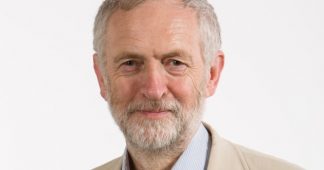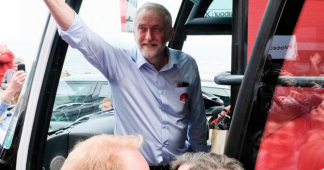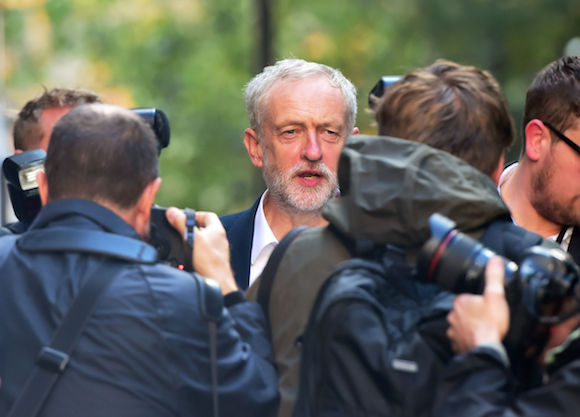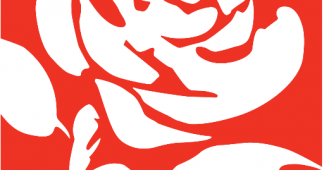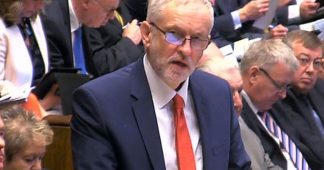Ian Parker
The Labour Party under Jeremy Corbyn has succeeded in breaking the hold of the Conservatives on British politics. It is Corbyn who has brought the Labour vote up to the highest level – in percentage and total vote – for twenty years, and the biggest ever single increase in the Labour vote. The question now is not if May will go, but when. The result also puts obstacles in the way of a ‘hard Brexit’. This victory for Corbyn, to be clear, is still within the limits of an electoral system geared toward the right, and internal Labour bureaucratic procedures geared to protecting sitting MPs who are rewarded by various competing reactionary lobby groups. This success is also within the limits set by the Scottish National Party (SNP) and the weird alliances and manoeuvres of the unionist parties in Scotland – Scottish Labour and the Conservatives – which meant that Corbyn would always have been deprived of a working parliamentary majority at Westminster.
The election campaign has put the political project of the Labour Party National Executive Committee and the majority of tory-lite MPs into question, legitimating radical policies and energising a new generation of activists. Corbyn was hobbled by the restrictions placed on the content of the Labour manifesto and by the stubborn refusal of many MPs to include elements of the manifesto they disagreed with in their own local publicity, by exclusion of Corbyn’s image from many local Labour campaign leaflets, and even, in some cases, outright sabotage of the national Labour Party campaign. The manifesto could not include, for example, the decommissioning of Trident nuclear missiles and the conversion of nuclear-military jobs into socially-useful production, and this fault-line in the LP was seized on by the media and exploited by some anti-Corbyn MPs.
Corbyn was still, against all these odds, able to lead a radical campaign and, more important, to energise a new generation of voters, some of whom will continue the campaign for jobs, for the NHS and for human rights beyond 8 June. A majority of voters under 50 supported Corbyn, and a sizeable proportion of the over 50s voters were also won to his politics, or won back to LP politics after their defection during the treacherous Blair years. Many of those who joined Labour to back Corbyn during the two internal party elections for leader came out during the campaign not only to vote but also to leaflet and canvas, and for many of those who did get involved it was their first involvement in party politics.
However, most of the foot-soldiers in the Labour campaign were long-standing members of the party, doggedly carrying on in the face of the media-barrage against Corbyn, and pitching in behind their local MP. This hard work by the local Labour campaign teams and the flying visits to marginal constituencies understandably led to more recrimination against the ‘Corbynistas’ during the election. The absence of the new members was noted, and the price will be paid for this in the months after the election as the right-wing Labour MPs regroup and local activists suspicious of Corbyn will regroup behind them. This sizeable vote was for Corbyn but we should take care not to exaggerate what it means for the composition and politics of the Labour Party. It has not changed the composition of the Parliamentary Labour Party, and we have seen an influx of some unpleasant new right-wing Labour MPs who pose a serious danger to the so-called Corbyn revolution. Every vote we gathered for the left during the campaign will also strengthen the party apparatus and its reduction of politics to an electoral machinery, and this success will be used, as always, against the left.
The ‘new’ members and other supporters of Corbyn working with Labour on the doorstep were mainly existing activists from Left Unity or from other left groups who had thrown themselves into the campaign knowing full well that this election was a make and break moment, that it could be the making of a new left and it could break the Conservatives. There are consequences of the way this campaign was conducted on the ground now, both for the way that Labour activists in local wards and constituency parties will relate to the new left, and the way that Left Unity can relate to the mass movement for Corbyn.
From inside Labour we can reasonably expect that, given the political composition of most of the local party wards, there will not be the warm gratitude coming our way that we might wish for. We can, instead, expect a degree of caution towards us and even measured hostility; we will still be perceived as those who are rocking the boat. Corbyn’s victory – a massive increase in the vote and number of Labour MPs – will not lead to eager acceptance of Corbyn’s politics, rather a closing of ranks around the apparatus on the rationale that now is the time to consolidate Labour’s gains and heal the wounds of the splits that began to open up in the party. We saw grudging acceptance of Corbyn’s contribution during the campaign, and the Labour Party apparatus knows that it will need to bide its time before attempting to remove him. Their thanks for his help will turn into a complaint that the result could have been better, and the loyalty of new members will be impugned, systematically side-lined. The attempt by different left groups to join Labour and intervene in the internal debates will, in most cases, be viewed as ‘entrist’ dishonest interference – in the case of some groups, let’s face it, it will be entrist and dishonest – and that will intensify the problem. Corbyn supporters will balance political challenge with pragmatic expressions of loyalty to the party. Electoral success will not, for sure, lead to a questioning of electoral politics. Instead, the ‘long hard journey’ narrative will, for many long-standing Labour members, be reinforced by this success.
Just as participation by ‘outsiders’ was only tolerated on the basis that we gave out Labour’s own leaflets and nothing more, said nothing different, so Labour party meetings will, in most parts of the country, continue to be deadening to radical politics after the election. Seasoned activists in Left Unity or other left groups might be able to tolerate this and sustain themselves under this pressure, but it would be disastrous to encourage activists in the new Corbyn movement to actually join the party and suffocate inside it. We will not win people to our politics by encouraging them sign up to Labour, but will lead them instead into the labyrinthine machinery of the party, if they are not repelled altogether from politics by the experience.
Left Unity members need to be clear with the Labour activists they worked with during the campaign that they have no intention of colluding in this internal party apparatus politics, and that we actively participated in the election campaign alongside them, not so we could all carry on with business as usual, but precisely because we wanted to create the conditions for something different. We stayed outside the Labour Party because that meant that we had more room for manoeuvre, and that, more than ever, we must have that room for manoeuvre to be a critical friend of the few left Labour MPs, to campaign against cuts carried out by Labour councils and to build a real mass movement for Corbyn that works across the limits that are imposed by Labour membership and restrictive ‘loyalty’ to the party as such.
Any continued success for Corbyn and the new revived Labour movement that he has made possible will depend on a radical break with some of the old assumptions about British politics made by the party. We need to say to our new Labour Party friends that we need freedom of movement to be able to really build something out of this electoral success, and that means that we, and they with us, must begin to reshape the political terrain.
A crucial part of this reshaping of the terrain that the Corbyn movement must engage with, with serious implications for mainstream Labour politics, is what we do with Scottish Labour. The success of Corbyn south of the border is intimately connected with the success of the independence movement north of the border, a movement that must break with the Scottish National Party which it is too-closely associated with. Scottish Labour ran a brave campaign, and, as was the case for many old Labour MPs across Britain who knew they had to pull together to save their jobs, they were, during the campaign period, relatively loyal to the Corbyn leadership. Nevertheless, Scottish Labour worked with the other unionist party in Scotland, the Conservatives, to try and block the SNP. They, the unionists, also succeeded, reducing the SNP vote by 13%, and taking 21 seats from them (12 to the Tories, 6 to Labour and 3 to the Lib Dems). This unionist success takes the edge of Corbyn’s victory, making a tactical alliance with the SNP to form an anti-austerity government impossible. This, along with the increase of seats by the Democratic Unionist Party in the north of Ireland (from 8 to 10 seats), and the refusal of Sinn Fein to take up the 7 seats it won, will make ‘Conservative and Unionist’ government, in the short term at least, possible. Left Unity must now speak out for Scottish independence – this is one of the breaking points that will make it difficult, if not impossible, for its members to join the Labour Party – and argue for Corbyn to build tactical alliances against the Conservatives.
Left Unity should also, as part of this sustained pressure on the Labour Party from the outside, explicitly argue for the right to affiliate to Labour. This declared open policy of Left Unity – that we see ourselves as part of the Corbyn mass movement – should be the basis for any possible meetings and campaigns with allies inside the party. We worked together across the party boundaries during the election campaign, and we must work together across those boundaries now. The Greens too maintained themselves as a credible force, not only by retaining the one seat in parliament but also by standing aside in some constituencies and campaigning for Labour, functioning as one of the models of independent left politics in the Corbyn movement. Left greens are our comrades in this struggle, in this new phase of struggle opened up by Corbyn.
A strong left presence inside the Labour Party is in our interests if it is to be open to action for change beyond election time, and we believe that this left presence will be better able to connect with the mass movement by explicitly connecting with us. Some of our comrades in different left organisations, including comrades who were once active in Left Unity, will be working inside Labour on this basis. Perhaps it is possible to turn some local Labour Party wards outwards, to make them bases of the movement that Corbyn inspired. Good luck to those working inside the Labour Party to do that, and we must do all we can to support them. But, we will only have the strength to maintain and build this independent left political profile if we organise outside Labour and win as many as possible of the new activists to Left Unity now, to build that independent left political profile with us.
